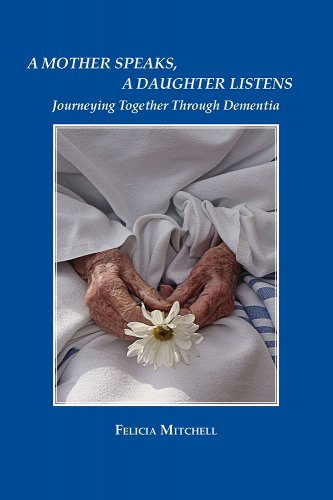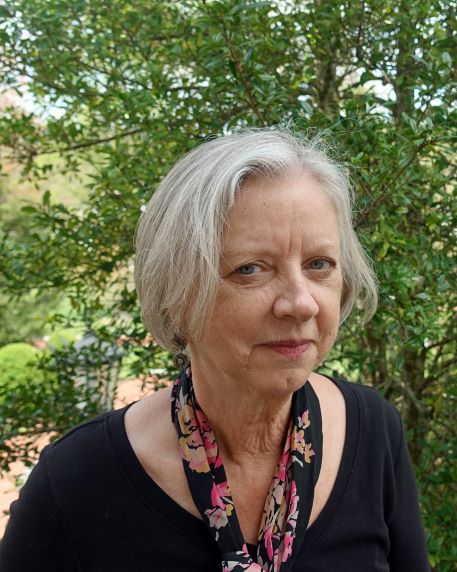Editor’s Note: This exchange is part of a series of brief interviews with emerging writers of recent or forthcoming books. If you enjoyed it, please visit other interviews in the I’ve Got Questions feature.
- What’s the title of your book? Fiction? Nonfiction? Poetry? Who is the publisher and what’s the publication date?
A Mother Speaks, A Daughter Listens: Journeying Together Through Dementia, from Wising Up Press, is a book of poems with a release date of September 1, 2022.
- In a couple of sentences, what’s the book about?
The book recognizes the spirit and resilience of a woman with dementia along with reflections on a relationship between daughter and mother from early days through nursing home and hospice to after the mother’s death.
- What’s the book’s genre (for fiction and nonfiction) or primary style (for poetry)?
The poems are mostly what one might call lyric verse with narrative elements, some poems more lyrical and others more narrative, and the book also includes my mother’s voice through found poems and through poems I composed in her voice. The poems can stand alone, most of them, but there is a narrative arc inviting the reader to engage with them holistically.
· What’s the nicest thing anyone has said about the book so far?
I will share here some of a review Terri Kirby Erickson has written because these words from an insightful poet and reader (and dear friend) validate the effort it took to create this book: “These women’s stories are real and true, their interactions via Mitchell’s exquisite poems as raw and honest as anything I have ever read, but tender, too, reminding us, again and again, that love outlasts memory and, indeed, transcends even death.”
- What book or books is yours comparable to or a cross between? [Is your book like Moby Dick or maybe it’s more like Frankenstein meets Peter Pan?]
It might sound glib for me to say that there is no book like my book. I will admit instead that I am intrigued by intertextuality and cross-genre writing, so think of books like that, or perhaps that treasure trove of letters, diaries, and faded handwritten poems you find in a box in an attic to learn of a past life. The book is also a bit like a documentary film.
- Why this book? Why now?
Although I wrote poems about my mother my whole life (and an early one serves as epigraph), I began writing this book in earnest after my mother came to live in a nursing home near me. These were complicated years during which I fell in love with her all over again, going back to the innocent love a child can hold at the same time we were immersed in a very adult and complex relationship. Through these years and beyond, the collection went through many conceptualizations and revisions until it found its center. With the pandemic, and so much solitude, and with my retirement from teaching in 2020, I was able to focus on shaping it to seek a publisher that shared my social vision for the book. I might also say that with time I had more distance from the subject and could more easily, as Wordsworth advised, recollect great emotion in tranquility. My mother died in 2011.
- Other than writing this book, what’s the best job you’ve ever had?
I enjoyed 33 years teaching at a liberal arts college, Emory & Henry College, which gave me creative autonomy in my scholarship and in the classroom. I loved teaching a range of courses from writing to creative writing to linguistics (and more).
- What do you want readers to take away from the book?
I hope that readers see better through the distorted lenses sometimes assigned to visions of dementia, to see what remains when a person changes. I want readers to enter the conversation my mother and I had and carry it on in their own lives as they talk about dementia. I want readers to understand that when somebody forgets, we remember instead, if we can.
- What food and/or music do you associate with the book?
My mother loved Edith Piaf’s songs, which I play to remember listening with her, one of which I mention in the book. This question also invites me to remember her dancing in the living room to the Fantastic Johnny C’s “Boogaloo Down Broadway,” but that is a story for another time, though the book does disclose how she loved to dance. As for food, I will always associate chicken perlo made from scratch (no sausage in ours), a childhood favorite, with my mother. It involves a mélange of simple ingredients in one dish, sort of like this book.
- What book(s) are you reading currently?
I just started the Horse by Geraldine Brooks. By the time this interview appears, I will have finished Marilyn Kallet’s new book of poems, Even When We Sleep (Black Widow Press).
Learn more about Felicia on her website
Buy a copy of the book from the publisher, your favorite indie bookstore, Bookshop.org, and other national booksellers.



